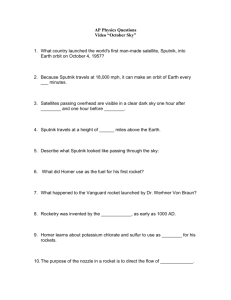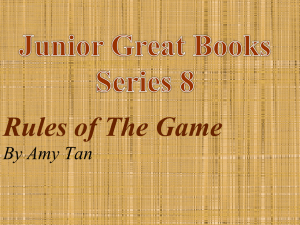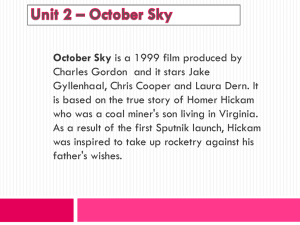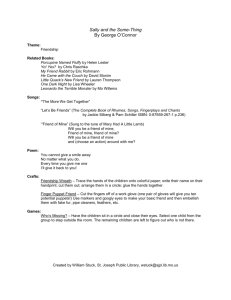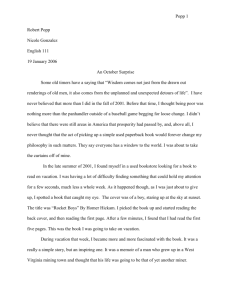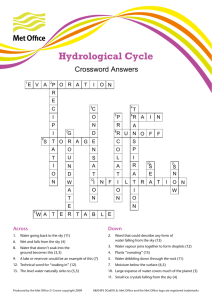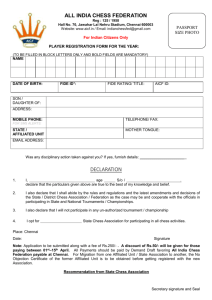October Sky Activities
advertisement
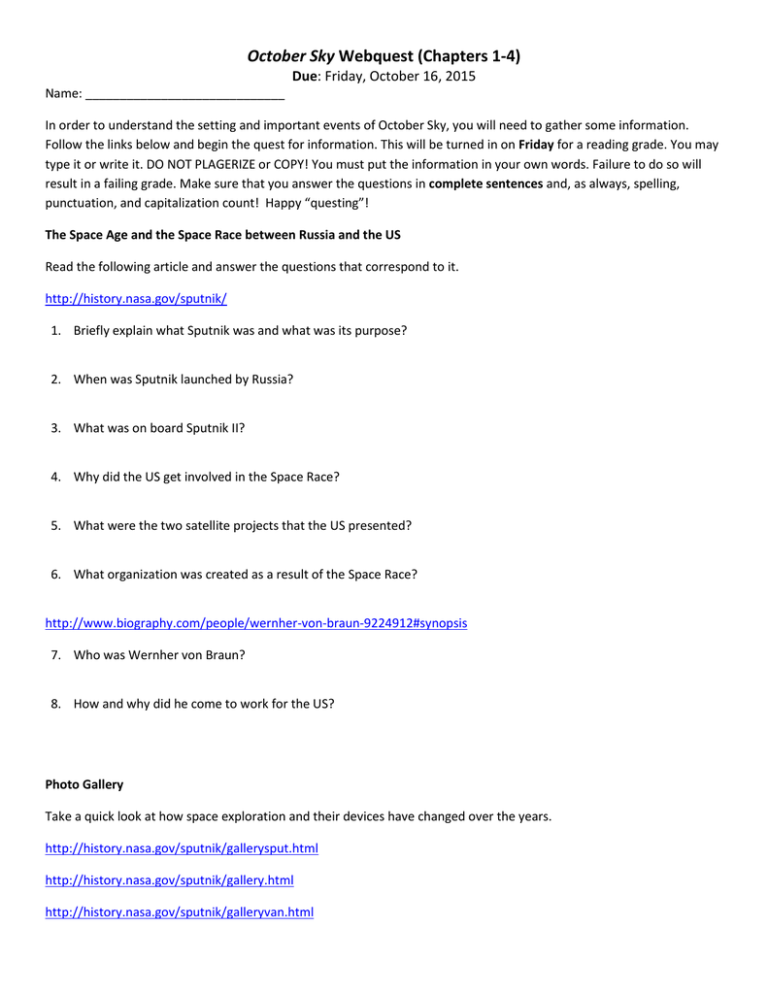
October Sky Webquest (Chapters 1-4) Due: Friday, October 16, 2015 Name: _____________________________ In order to understand the setting and important events of October Sky, you will need to gather some information. Follow the links below and begin the quest for information. This will be turned in on Friday for a reading grade. You may type it or write it. DO NOT PLAGERIZE or COPY! You must put the information in your own words. Failure to do so will result in a failing grade. Make sure that you answer the questions in complete sentences and, as always, spelling, punctuation, and capitalization count! Happy “questing”! The Space Age and the Space Race between Russia and the US Read the following article and answer the questions that correspond to it. http://history.nasa.gov/sputnik/ 1. Briefly explain what Sputnik was and what was its purpose? 2. When was Sputnik launched by Russia? 3. What was on board Sputnik II? 4. Why did the US get involved in the Space Race? 5. What were the two satellite projects that the US presented? 6. What organization was created as a result of the Space Race? http://www.biography.com/people/wernher-von-braun-9224912#synopsis 7. Who was Wernher von Braun? 8. How and why did he come to work for the US? Photo Gallery Take a quick look at how space exploration and their devices have changed over the years. http://history.nasa.gov/sputnik/gallerysput.html http://history.nasa.gov/sputnik/gallery.html http://history.nasa.gov/sputnik/galleryvan.html Homer Hickam http://wvwc.edu/library/wv_authors/homer_hickam.html 9. Who is Homer Hickam? Write at least one fact about him from each paragraph from this article (7 total). 10. Who was Miss Freida Riley? http://www.homerhickam.com/coalwood/riley.shtml, http://www.nmoe.org/riley 11. Use the following website and jot down three important pieces of information on shaft mining. http://library.thinkquest.org/05aug/00461/shaft.htm Jot down information on black lung disease from the following website: http://www.webmd.com/lung/tc/black-lungdisease-topic-overview 12. What is another name for the disease? 13. What causes this disease? Character Sketch Chapters 5-8 of October Sky Due: Friday, October 22, 2015 Your character sketch and graphic organizer should resemble this example with your character from October Sky. Create a graphic organizer like what is below, and NEATLY on a sheet of loose leaf, fill in what you have in your graphic organizer to neatly write a paragraph that covers all four types of characterization. You need to include at least TWO QUOTES from the novel that explain two of your chosen character traits with the page number. This doesn’t mean that you can just say what happens in the novel! Also, I don’t want your OPINION! No “I think” or “I like!” You MUST include at least 5 of your unit vocabulary words from this week-highlighted! Refer to the example below to help you. This is a reading grade for content and an English grade for writing. Basic Facts -7 -narrator -has a brother -lives in Chinatown, San Francisco -Chinese-American -Thick black hair “…Chinese-American with thick black hair” (p. 6) Personality Interests and Talents -excellent and talented chess player -she is intense and beats older people at chess Waverly Place Jong -friendly and bold-because she walks up to random people and asks to play -determined-On page 38, she is determined to become a better chess player by “giving up many of her lifesavers to win games and learn more.” -stubborn Important Relationships -trusting-Lau Po made her successful and teaches her everything he knows -stubborn-Her mother and she have a relationship where her mother pushes her to do better when she is stubborn Example Character Sketch: The narrator of the story Waverly Place Jong has choices to make in life, and she learns them by playing the game of chess and by “giving up many of her lifesavers to win games and learn more” (p. 38). She is a seven-year-old girl who lives in Chinatown, San Francisco and is a “Chinese-American with thick black hair” (p. 6). She learns to play chess and realizes soon after that she is naturally talented at playing the game. She is a determined character who goes on to win many chess tournaments. Waverly is also friendly and bold and walks up to strangers, asking them to play chess with her. She is also very intense and even beats people older than her at chess! In the story, Waverly has a important relationship with a man named Lau Po. Without his help, she wouldn’t be as successful at chess. Waverly also has a strong relationship with her mother, who gives her the courage and pushes her to do her best even when she doesn’t want to. Though Waverly can be stubborn at times, she is a very talented girl, and we can conclude through her life lessons with the game of chess that she will go very far in her life. Descriptive Writing Chapters 9-12 for October Sky Due: Friday, October 30, 2015 Reread the section on Sonny’s journey down into the mine with his father, walking around inside the mine, and then emerging back into the sunlight where his mother is waiting for him, outraged that he lied to her about why he couldn’t go to church that Sunday. Imagine that, like Sonny, you went down into the Coalwood mine against your mother’s wishes. Write A 150-200 word journal entry, describing what you see, hear, smell, and feel in the mine. Use colorful language and be specific in your observations. You MUST include at least 5 of your unit vocabulary words from this week-highlighted! Refer to the example below to help you. This is a reading grade for content and an English grade for writing. Record your observations about each part of the mine that you visit. Including the following: • Your reaction to the experience of walking through the mine, which should be filled with emotional language that makes readers feel as if they’re right beside you in the mine. The entry should answer the following questions: How does it feel to go deep into the earth, to leave the sunlight behind and venture into the unknown? How does it feel to have to bend down to walk because you can’t stand up straight in the mine tunnels? What surprises you about the mine? What lessons did you learn from this experience? • What happens when you are confronted by your mother about the experience of going into the mine and how they both felt about that exchange. Does the mother have a point? If so, what is it? Is it valid? Why did you lie to your mother and went against her wishes? Example: Inside, the school smelled smartly of varnish and wood smoke from the potbellied stove. On gloomy days, not unknown in upstate New York in this region south of Lake Ontario and east of Lake Erie, the windows emitted a vague, gauzy light, not much reinforced by ceiling lights. We squinted at the blackboard, that seemed far away since it was on a small platform, where Mrs. Dietz's desk was also positioned, at the front, left of the room. We sat in rows of seats, smallest at the front, largest at the rear, attached at their bases by metal runners, like a toboggan; the wood of these desks seemed beautiful to me, smooth and of the red-burnished hue of horse chestnuts. The floor was bare wooden planks. An American flag hung limply at the far left of the blackboard and above the blackboard, running across the front of the room, designed to draw our eyes to it avidly, worshipfully, were paper squares showing that beautifully shaped script known as Parker Penmanship. Personal Memoir Chapters 13-17 for October Sky Due: Friday, November 6, 2015 A memoir is the story of a memory that you have about something specific that occurred in your life-not your life story. On loose leaf, write a 150-200 word memoir by taking the ideas and feelings from your completed graphic organizer (see back). Show (don’t tell) your reader the details of the moment and use excellent word choices to explain your moment. You MUST include at least 5 of your unit vocabulary words from this weekhighlighted! This is a reading grade for content and an English grade for writing. Follow the guidelines below. Choose a topic for which you have the most details and recollection of and something that matters to you. This will be the central event/idea you will write about. Write as much as you can for that topic but focus only on that topic. Be sure to capture your reader’s attention in the opening lines. Good memoirs often include the “good” and “bad” of an event. Having a mix makes a quality writing. Include dialogue and narrator’s thoughts as needed and use first-person pronouns since you are telling the memory. Remember, you are NOT writing a story- instead you are reflecting on a memory, so “show” the reader through imagery, details, and choice vocabulary, rather than “telling” the reader what happened (refer to the example below). Make sure the reader(s) can identify your theme/lesson learned/your thoughts or feelings about that memory- whether you state it directly or imply it in your story. Some topic ideas include: a childhood event, achieving a goal, the good and the bad, learning a lesson, teaching a lesson, standing up for yourself or someone else, becoming stronger, a new experience, family traditions, love, or come up with your own. The Accident By Mrs. Caserta Feeling stuffed after a hefty lunch, I found myself enjoying the conversation between my husband, children and me. It was a warm, sunny Sunday afternoon. The skies were clear, and there weren’t many people on the road. Finding myself stewing over all of the things that I had to get completed before the end of the day to prepare for the coming week, I was lost in thought. Grocery shopping, grading papers, washing clothes. It was the same redundant list every Sunday, and I needed all of the time left in the day that I could get. As our relaxed chat continued, we turned onto our avenue two blocks from home. I noticed out of the corner of my eye a champagne colored Buick coming to the intersecting stop sign. Realizing that it wasn’t going to stop at the appropriate sign, my hand pointed towards it, and I said firmly, yet quietly to my husband, “I don’t think that they are going to stop!” Heeding my warning, my husband quickly swerved our vehicle to try and avoid a collision, but it was too late! I braced myself. A loud, abrasive gunshot went off towards the rear of the car. A momentary loss of feeling as to what was occurring took over me. We spun in slow motion. Then, we suddenly stopped-sideways. I looked to my left to my husband who was screaming hysterically, “Are the kids ok?” I turned towards the back of the car, fearful of what I would see yet worried about my children. When I turned, I saw the panic and fear in their eyes. They had been completely unaware of the event that had just occurred. I grabbed them quickly to ensure their safety. They accepted the comfort of their mother and relaxed in my arms. We had been in an accident, but we were safe and unharmed. It was one of those memories that no one forgets and makes you appreciate the little things in life and to be grateful for each and every day. News Article Writing Groups October Sky Chapters 18-22 Due: Friday, November 13, 2015 Using a more straightforward, objective reporting style than Basil Ogelthorpe’s, you and your partner(s) will write ONE of the following articles of your choice collaboratively. Turn only ONE copy in to me on loose leaf with BOTH names on the assignment. You MUST include at least 5 of your unit vocabulary words from this week-highlighted! This is a reading grade for content and an English grade for writing. Parts of a Newspaper Article Before you write your first draft, you should be aware of the parts that make up a news report. Headline or Title: The title of your news article should be catchy and to the point. You should punctuate your title by capitalizing, but words after the first word are typically not. Of course, you will capitalize proper nouns. Numbers are not out. Examples: Lost dog finds his way home Debate tonight in Jasper Hall Panel chooses 3 essay winners Byline: This is your name! The byline is/are the name(s) of the writer. Lead/Lede: The lead/lede is the first paragraph, but it is written to provide a preview of the entire story. It summarizes the story and includes all of the basic facts. The lead/lede will help readers decide if they want to read the rest of the story, or if they are satisfied knowing these details. For this reason, lead/lede may contain a hook. The Story: Once you’ve set the stage with a good lead, you follow up with a well-written story that contains facts from your research and quotes from people you’ve interviewed. The article should not contain your opinions. Do not use “I”! Detail any events in chronological order. Use active voice—avoid passive voice when possible. In a news article, you would typically put the most critical information in the early paragraphs and follow with supporting information, background and related information. Writing Topics to choose from: • • • • A news story about the rocket boys. You will need to make up quotes on their speaking style and opinions to give the article a story will focus on why they decided to build rockets, what to them, how they worked with the community to rally rocket-building enterprise, and the impact this project might A feature story about the machinists who watch the rocket launch, with quotes from several of them, also in their own “voice.” In this story, students should explain what it means to the machinists to contribute to the rocket-building effort, what they think of the Rocket Boys and their vision of sending rockets into space, and how they think this project will affect Coalwood. An interview with Miss Riley, focusing on how she has seen Sonny and the other rocket boys develop over the years, the impact the rocket boys are having other students at Big Creek High School, and how rocket-building (looking up the sky) contrasts with coal mining (looking down into the earth) in a town entire economy is based on coal mining. An editorial about the rocket launches, expressing a point of view either in favor against this scientific venture. EXAMPLE: Children at work Millions of children around the world must work for food and shelter — Karen Fanning Bonauli Simamora stands on a rickety fishing pier, staring at the waves slapping at the wooden beams below. With the sun's rays beating down on his back, the 14-year-old hauls up a giant fishing net, careful not to lose his balance and fall into the ocean. For the past nine months, Bonauli has worked 7 days a week, 10 hours a day. From sunrise to sunset, he labors on a pier that sits 10 miles off the coast of Indonesia. spelled "I work from 8 in the morning until 6 at night," says Bonauli. "Every morning, I wake up, sort the fish, dry them, boil them, and put them into storage. Then I wait for the tide to go down and do it again." Bonauli is one of 120 million children worldwide, from ages 5 to 14, who work instead of going to school. Each day, nearly 80 million of these children risk their health, safety, and often their lives, to earn money. detailed Endangered Lives "Child labor is cheap labor," says Darlene Adkins of the Child Labor Coalition, a group that works to end child labor abuses the around the world. As many as 70 percent of the world's working children labor on farms, picking crops, herding cattle, and operating equipment. In the fields, they are exposed to dangerous pesticides, or poisonous chemicals. Pesticides increase the children's risk of developing lung disease. In India, Nepal, and Pakistan, boys and girls work up to 16 hours a day weaving carpets in small huts with little light or fresh air. Loom owners sometimes chain children to the looms, so they won't run away. information, "Their hands are dry, cracked, and gnarled from labor," Adkins says. In Peru, young boys work in mines, digging for gems and coal deep below the earth's surface. As they crawl through dark, cramped tunnels, the boys risk death from cave-ins. from themAround based the world, girls as young as 5 work up to 15 hours a day, 7 realistic feel. This days a week as housekeepers. this project means support fornot their "These children are living with families, but they are considered part of the family," sayshave Adkins. they are on "Often, their futures. beaten, only fed leftovers, and are forced to sleep on the floor. They are treated as slaves." Stopping Child Labor Students at Broad Meadows Middle School in Quincy, Massachusetts, created their own Web site to educate Americans about child labor. The students raised more than $100,000 through the Web site to help build a school in Punjab, Pakistan. Today, 288 on children, who might otherwise be weaving rugs or stitching toward soccer balls, attend class instead. where the For Bonauli, school seems like a distant dream. After endless months of backbreaking labor, the homesick teenager has just one wish: to see his family again. of or For now, Bonauli works and waits. Yearbook October Sky Chapters 23-Epilogue Due: November 20, 2015 Every high school graduating class has a yearbook with a short paragraph about each student who’s graduating that year. Most of these write-ups include a short synopsis of the student’s accomplishments in high school and future aspirations. You are on the yearbook staff for Big Creek High School in War, West Virginia, and the yearbook editor has assigned you the task of writing thumbnail sketches on the following graduating seniors: • Roy Lee • O’Dell • Sherman • Dorothy • Valentine In one or two paragraphs on loose leaf, totaling no more than 150 words each, write a capsule summary of the high school career and accomplishments of each of these students. In writing these summaries, be sure to make inferences about each student, based on his or her actions, statements, and thoughts as recounted in October Sky. You MUST include at least 5 of your unit vocabulary words from this weekhighlighted! This is a reading grade for content and an English grade for writing. Your summary, which should be written in full sentences, should touch on the following points: • the student’s academic strengths • the student’s personality and character • the student’s future goals
